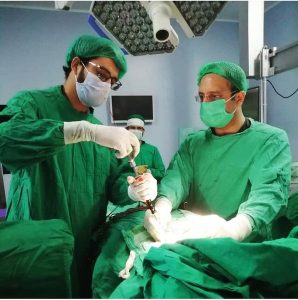Minimally Invasive Surgery: Technological innovations in the field of Medicine.
Medically speaking, Neurosurgeons use Minimally invasive surgical procedures with every other patient who needs standard open invasive procedure as an alternative option. By incidentally the famous noninvasive neuronavigation equipment and the neurosurgeons can be weaned off making small incisions and at times they can place the scars in a manner that they are cosmetically done.
Utilizing incisions of merely a centimeter or less, neurosurgeons introduce their forefingers into it, followed by small tools made of metal called retractors, which in turn cut through the muscles and the soft tissues till they reach the spine. All degenerate disc material placed removed and passed through the retractor, and any devices used to perform fusion procedures, which fuse together and heal painful vertebrae into a single, solid bone, are also inserted through the retractor. Because the opening for the repair is so small, the surgeon doesn’t have to detach, remove or rearrange the big muscles, normal bone lines, or the bundles of nerves.
In contrast to the open back surgery that uses a big cut to access the central nervous system, minimally invasive spine surgery has a lot of benefits. The fact that it is less invasive leads to faster recovery times and enables the patient to go home in a few days after hospitalization. (Less than day 2.) Besides, the pain after operation decreases and scarring becomes less visible. However, this spine surgery above all else is limited in the volume of tissue damage especially in the muscles surrounding it. This is a reduction of the risks during the operation particularly due to the loss of plenty of blood, bruising, and infections.
In the Western Cape hospitals, that is currently running a project labeled: “Minimally Invasive Spine Surgery (MISS),” Dr. Waqas Mehdi (Assistant Professor) is the lead consultant. The cadaver (Dr. Neurosurgery) will then analyze the limitations of open surgery using spirits to access the spinal column and will do so while taking care not to damage the surrounding tissues that take place in open surgery. With minimally invasive procedure, patients require anesthetic much less or rather can be sedated for analgesic treatment, thus the patient is aware during the surgery, and the doctor can watch the patient’s reaction to possible pain position.

Minimally invasive procedure surgery that involves smaller incisions and shorter recovery time.by Dr Waqas Mehdi.Learn more about these procedures
Advantages of Minimally invasive surgery:
-
Quick Recovery afterinvasive procedure :
The minimally invasive procedure spine surgery makes the rehabilitation process faster because of the smaller incisions, less blood loss, and no need for disruption to muscle function. Many of these patients get back to their jobs in a short period of not more than a month.
-
Low Infection after invasive procedure:
Disadvantages of minimally invasive spine surgery include a higher risk of infection. However, there are fewer complications in this type of surgery than there are in traditional surgery due to the much smaller incisions.
-
Less Pain after invasive procedure:
Minimally invasive spinal patients note having less pain than conventionally open surgery due to fewer anatomical pathways including the muscles’ interrupts.
-
Less Traumatic after invasive procedure:
With minimally invasive spinal surgeries we limit the damage caused to the muscles and ligaments around the spinal cord, which subsequently leads to reduced patient trauma levels and again, we improve the surgical outcomes.
-
Less Scars after invasive procedure :
The result of open-spine procedures is that the surgery unquestionably leaves significant scars visible on the patient’s back. On one hand, minimally invasive spine surgery which, instead of open surgery empties the blood loss, tissue scarring, pains and damages to tissues is less likely.
